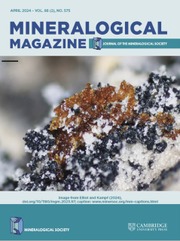Article contents
Composition and genesis of albitite-hosted antecrystic pyrochlore from the Sevattur carbonatite complex, India
Published online by Cambridge University Press: 28 January 2021
Abstract
The Neoproterozoic Sevattur complex is composed essentially of calcite and dolomite carbonatites together with pyroxenites and diverse syenites. This work reports the compositions and paragenesis of different pyrochlore generations hosted by albitite veins in this complex. The pyrochlore are distinctive, being exceptionally rich in uranium (26 to 36 wt.% UO2). Five types of pyrochlore (Pcl-I to Pcl-V) are recognised on the basis of composition and texture. With the exception of Pcl-V, the majority of the pyrochlore (Pcl-II to Pcl-IV) are surrounded by a thick orbicular mantle of Ba-rich potassium feldspar. This mantle around Pcl-V is partially-broken. Pcl-I is restricted to the cores of crystals, and associated with Pcl-II and -III and is relatively rich in Nb (0.53–0.62 apfu) together with more A-site vacancies (0.37–0.71 apfu) compared to Pcl-II to Pcl-IV. Other pyrochlore (Pcl-II to Pcl-IV) are characterised by elevated Ca and Ti compared to Pcl-I, which are related to the (3Nb5+ + Na+ → 3Ti4+ + U4+) and (2Nb5+ → 2Ti4+ + Ca2+) substitutions, respectively. These substitutions represent replacement of Pcl-II to Pcl-IV. Alteration and Ba-enrichment in all the pyrochlore are marked by interaction with an externally-derived Ba-rich hydrothermal fluid following the (2Nb5+ → 2Ti4+ + Ba2+) substitution. This substitution, coupled with extensive metamictisation leads to the formation of Ba-rich (15.9–16.3 wt.% BaO) patchy-zoned Pcl-V. The orbicular mantles around Pcl-I to Pcl-IV have prevented extensive metamictisation and extensive secondary alteration compared to Pcl-V, where mantling is partially disrupted. The compositional and textural variation suggests that Pcl-II to Pcl-IV form by nucleation on Pcl-I, and are transported subsequently as antecrysts in the host albitite.
- Type
- Article – Gregory Yu. Ivanyuk memorial issue
- Information
- Copyright
- Copyright © The Author(s), 2021. Published by Cambridge University Press on behalf of The Mineralogical Society of Great Britain and Ireland
Footnotes
This paper is part of a thematic set ‘Alkaline Rocks’ in memory of Dr Gregory Yu. Ivanyuk
Associate Editor: Anton R. Chakhmouradian
References
- 5
- Cited by


